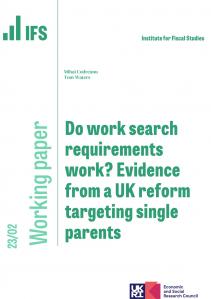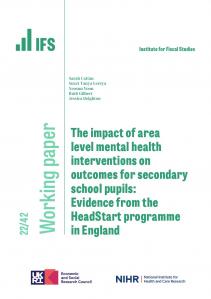Since 1995, police forces in England and Wales have been able to raise revenues locally to supplement grants from central government. We analyse the variation across police force areas in locally raised police revenues over the 2000s, and we find that three‐quarters of the temporal and spatial variation in local revenues per head can be explained by differences in incomes, prices and local preferences. A particularly robust parameter is the effective local community tax price associated with raising revenue. We discuss the police funding model in the wider context of fiscal federalism, and we point to alternative funding structures that could be adopted.
Authors

Research Associate University of Sussex
Richard is an IFS Research Associate, a Part-time Professor of Economics at the University of Sussex and a Visiting Professor of Economics at UCL.

Rowena Crawford

Polly Simpson
Journal article details
- DOI
- 10.1111/1475-5890.12206
- Publisher
- Wiley
- Issue
- Volume 4, Issue 40, February 2020, pages 663-685
Suggested citation
R, Crawford and R, Disney and P, Simpson. (2020). 'Financing local police spending in England and Wales: fiscal federalism in practice' 4(40/2020), pp.663–685.
More from IFS
Understand this issue

Cuts to council services likely unless cost pressures abate – even with the biggest council tax increases for 20 years
21 June 2024

Election Special: Your questions answered
27 June 2024

Election Special: The big issues politicians haven't spoken about
25 June 2024
Policy analysis

How would the parties’ tax and spending plans affect Scotland and Wales?
28 June 2024

How should we interpret parties’ public spending pledges this election?
23 June 2024

Main parties’ manifestos tell us little about the funding individual public services would actually receive
23 June 2024
Academic research

Unfunded mandates and taxation
14 March 2024

Do work search requirements work? Evidence from a UK reform targeting single parents
1 February 2023

The impact of area level mental health interventions on outcomes for secondary school pupils: Evidence from the HeadStart programme in England
13 October 2022